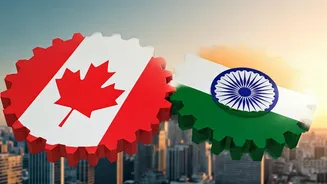Bridging The Divide
The relationship between India and Canada experienced a period of strain beginning in 2023. This downturn followed allegations from then-Prime Minister
Justin Trudeau regarding the Indian government's alleged involvement in the killing of Khalistani leader Hardeep Singh Nijjar in British Columbia. This led to a halt in free-trade negotiations. India strongly refuted these claims and retaliated by expelling Canadian diplomats. Despite the tension, high-level discussions have been underway since the summer to address national security concerns. The aim is to enable both leaders to concentrate on enhancing economic ties. India's new High Commissioner, Dinesh Kumar Patnaik, expressed the desire for a swift visit from the Canadian Prime Minister, indicating that strengthening the bilateral relationship is a priority. These actions suggest a willingness to rebuild diplomatic trust and reinvigorate economic engagement.
Addressing Security Concerns
High Commissioner Patnaik highlighted India's frustration over what it views as a double standard. He pointed out that while Canada demands India acknowledge evidence of its alleged role in violent incidents, Canada does not consider India’s evidence against Canadian-based Sikh separatists. Patnaik mentioned the increasing exchange of information and cooperation between Indian and Canadian security agencies. He clarified that India has been working with the Royal Canadian Mounted Police and the Canadian Security Intelligence Service, however, he maintained that India played no role in Nijjar’s killing or any other foreign-interference operations. Patnaik also shared an example of the threat from separatists. A group of Khalistanis showed up outside his home last week. They chanted for his death, carried posters with a target of the High Commissioner and offered a $10,000 reward. This shows the seriousness of the issue and the necessity for the security conversations.
Economic Engagement Focus
The primary focus of the upcoming discussions will be to foster economic ties between India and Canada. Patnaik emphasized the importance of high-level bilateral discussions to address national-security concerns, allowing both leaders to shift their attention toward expanding economic engagement. Potential areas of trade include oil and gas, nuclear energy, battery storage, fertilisers, processed foods, and agricultural products. India is also interested in collaboration on emerging technologies such as Artificial Intelligence and quantum computing. India is open to investing in Canada’s energy and critical minerals sectors, provided that there are clear and consistent investment guidelines, environmental safeguards, and clarity on Indigenous land rights. The discussions aim to move forward on a comprehensive economic and free trade agreement. This move signifies the mutual desire to build stronger economic ties.
Market Opportunities & Challenges
India is keen on expanding imports from Canada across various sectors. Canadian canola is particularly noted as having great potential in the Indian market, which is the world’s largest consumer of cooking oil. This could potentially help Canada reduce its reliance on China, which recently halted canola imports from Canada after tariffs were imposed on Chinese electric vehicles. However, High Commissioner Patnaik noted that breaking into India’s cooking oil market would require a concerted marketing push. This is because Indian consumers traditionally prefer oils made from sunflower, palm, rapeseed, and mustard seeds. This highlights the importance of market adaptation and targeted strategies. The focus on economic expansion and identifying mutually beneficial trade opportunities showcases the commitment of both countries to fortifying their economic partnership.
A Path Forward
Recent diplomatic efforts include a joint declaration signed by Canadian foreign affairs minister Anita Anand during her recent trip to New Delhi. This declaration emphasizes cooperation on law enforcement and the rule of law. It also lays the groundwork for further trade and economic engagement. The invitation to Prime Minister Mark Carney for early-2026 talks signifies the momentum toward a potential comprehensive economic and free trade agreement. The High Commissioner’s statements indicate a proactive approach to rebuilding the relationship and setting the stage for increased cooperation in diverse fields. The hope is that the Prime Minister will accept the invitation soon. If not, the High Commissioner will find time before March. He prefers to have the visit before May, when the weather in India heats up.



















